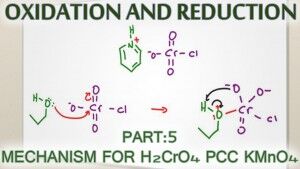 Oxidation of alcohols can be carried out by a variety of reagents.
Oxidation of alcohols can be carried out by a variety of reagents.
The most common mechanisms you'll study in your organic chemistry course involve Chromic Acid H2CrO4, Pyridinium Chlorochromate PCC, and Potassium Permanganate KMnO4.
The video below shows you how each of these mechanisms will react with primary alcohols to form an aldehyde or carboxylic acid, and a secondary alcohol to form a ketone.
(Watch on YouTube: Alcohol Oxidation Mechanism. Click cc on the bottom right for video transcript)
<–Watch Previous Video: Oxidation of Alcohols to Aldehyde Ketone and Carboxylic Acid
–>Watch Next Video: Carbonyl Reduction using NaBH4
This is video 5 in the Orgo Oxidation/Reduction Series. Click for complete series
Ready to test your redox skills? Try the Redox Practice Quiz and follow along with the Redox Cheat Sheet


